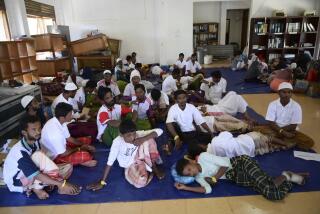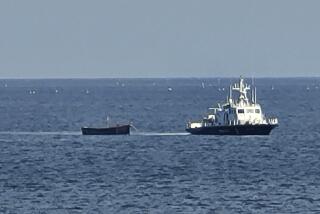21 N. Korean Refugees Sail Into South
- Share via
SEOUL — The largest group of North Korean defectors ever to escape to the South by boat arrived this morning at the port city of Inchon on a dilapidated wooden fishing vessel after a perilous two-day journey on the Yellow Sea.
Although record numbers of asylum-seekers are arriving in South Korea this year, the 21 people, including 10 children, who arrived today are among the few who have dared sail along the heavily patrolled maritime border.
“We escaped from the hunger,” 70-year-old Soon Jong Shik, the oldest of the defectors, reportedly told South Korean naval police.
The defectors set off at 4 a.m. Saturday from Hongundo, a port village 60 miles northwest of Pyongyang, the North’s capital, with enough fuel for a week. They sailed out to international waters to avoid North Korean authorities, then turned south. About 7 p.m. Sunday, they were spotted by the South Korean naval police, who thought they were trying to catch crab.
“Where are you from?” South Korean naval police Capt. Kim Jae Man shouted when the boat came within a stone’s throw, according to South Korean television. “Is your boat in trouble?”
“We are from the North. We escaped. We want to live in the South,” came back the reply.
Pointing rifles, the police boarded the boat to search for weapons and drugs. Instead, they found frightened defectors, the youngest an 8-year-old girl, hiding in fish storage rooms. Most members of the group were moved to the naval vessel, where they were served instant noodle soup and questioned.
In a heavy rainstorm, the fishing boat was towed to Inchon, west of Seoul. There, the asylum-seekers were taken into custody by South Korean intelligence.
This has been a banner year for defections, with nearly 600 people coming south so far--more than the 583 in all of 2001. One reason for the surge is an aggressive campaign by human rights activists and Christian missionaries. But activists here said this group escaped on its own.
“All indications are that this was a spontaneous effort by desperate North Koreans. It came as a big surprise to us,” said Tim Peters, an American who works with Norbert Vollertsen, a German physician who had said he would help “boat people” escape to South Korea.
Almost all the North Koreans seeking asylum in the South lately have gone through China. In the most publicized cases, activists have helped some people storm foreign embassies and consulates in China, demanding asylum.
Although fishermen occasionally manage to navigate their way south, there have been only two other instances in which large groups have escaped by boat. In 1997, 14 members of two families came to Inchon, and in 1987, 11 people escaped by boat to Japan.
Since the end of the Korean War in 1953, the South and the North have been separated by what is reputed to be the world’s most heavily armed border.
Activists predict that the success of this latest defection will encourage others.
“The North Koreans don’t have sophisticated equipment to stop small fishing boats. The biggest problem is that the North Koreans don’t have the money for fuel to make the trip,” said Douglas Shin, a Korean American minister who works with defectors in Seoul. “But the North Koreans know that their country is the opposite of a paradise. Many more of them will try to get out.”
The 70-year-old and his 46-year-old son, the boat captain, reportedly organized the escape. Family members from the South are said to have given them money for the trip through intermediaries in China.
According to South Korean media, the elder Soon was born in the South Korean town of Nonsan but was conscripted into the North Korean army when he was a teen.
“I wanted to step on the ground of my hometown before I died,” he told South Korean reporters in Inchon. “We planned a long time for this.”
*
Chi Jung Nam in The Times’ Seoul Bureau contributed to this report.
More to Read
Sign up for Essential California
The most important California stories and recommendations in your inbox every morning.
You may occasionally receive promotional content from the Los Angeles Times.













